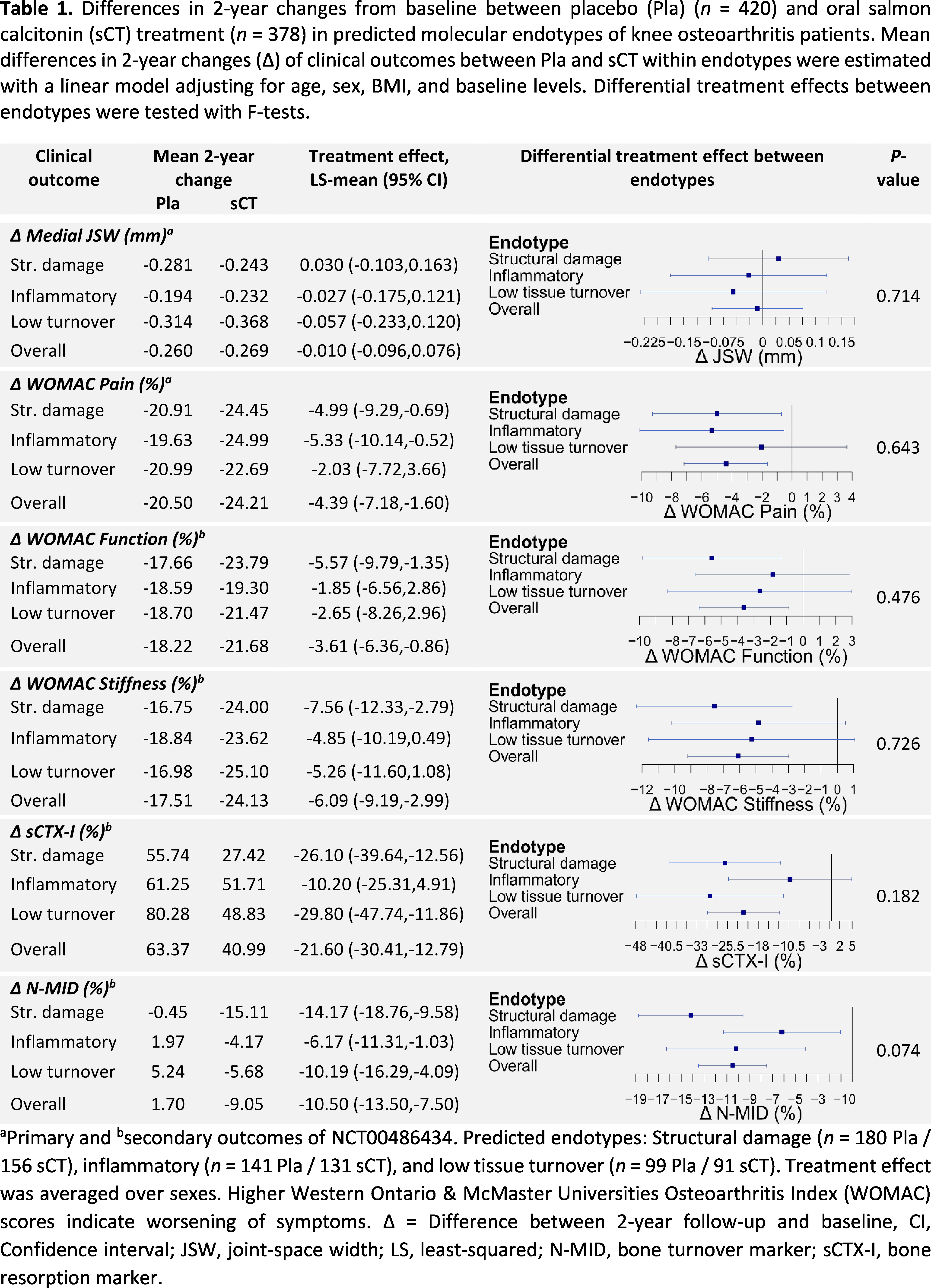Session Information
Session Type: Poster Session C
Session Time: 10:30AM-12:30PM
Background/Purpose: Osteoarthritis (OA) patients are to this day left without effective treatment options. Despite different etiologies, trials designs do not account for the substantial heterogeneity seen in OA, contributing to the high risk of unsuccessful trial outcomes. Endotypes of structural damage, tissue inflammation, and low tissue turnover have been discovered. These have yet to be validated by their differential treatment response and the clinical need to stratify patients into druggable endotypes or theratypes remains. The focus of this study was to develop a statistical model to stratify OA patients into endotypes and assess their response to oral salmon calcitonin (sCT) treatment.
Methods: Longitudinal measurements of markers of cartilage turnover (ARG, C2M, PRO-C2), bone turnover (sCTX-I, N-MID), and inflammation (C1M, C3M, VICM) of patients fulfilling the ACR criteria for knee OA (KOA) from the IMI-APPROACH cohort were included. Patients with longitudinally stable endotypes (n = 128) were used to develop a multi-class, logistic regression prediction model of structural damage, inflammation, and low turnover endotypes. To use the optimal panel of 6 biomarkers (log-transformed), all marker combinations were assessed (28 models) and run 100 times. 75% of the z-score scaled data was used for training, and 25% to assess predictions. Based on the highest mean sensitivity across all endotypes (87%), the final model included C2M, C3M, sCTX-I, N-MID, PRO-C2, VICM, plus age, sex, and BMI.
For evaluation of differential treatment effect of sCT, 798 KOA patients with data at baseline and after 2 years were included from the phase III trial NCT00486434 (SMC) evaluating the efficacy of sCT. Patients fulfilling the ACR criteria for KOA with target knee Kellgren-Lawrence grade 2-3, medial joint-space width (JSW) ≥ 2 mm, Western Ontario & McMaster Universities Osteoarthritis Index (WOMAC) pain > 150 mm, and/or function 510 mm were recruited. Biomarkers were log-transformed, all variables scaled, and endotypes were predicted at baseline. Mean differences in 2-year changes of clinical outcomes of sCT versus placebo within endotypes were estimated with linear models adjusting for age, sex, BMI, and baseline levels. Differential treatment effects between endotypes were tested with F-tests.
Results: 336 structural damage, 272 inflammatory, and 190 low turnover KOA endotypes from SMC were predicted (Table 1). Structural damage tended to lose less JSW when comparing sCT to placebo with significant sCT response in all WOMAC subscores, but overall, the analysis did not provide strong evidence of differential treatment effects of sCT between the endotype. The low turnover endotype tended to lose the most JSW when comparing sCT to placebo, with no apparent response in WOMAC.
Conclusion: The findings suggest that it is possible to stratify endotypes based on a targeted biomarker panel. Responses to treatment in the subgroups may subtly indicate benefit of pairing the right endotypes with biologically matching treatments, and merits further investigation. Biomarker-based stratification of molecular endotypes represents a promising avenue for targeted development of personalized OA treatments.
To cite this abstract in AMA style:
Hannani M, Frederiksen P, Karsdal M, Bihlet A, Bacardit J, Bay-Jensen A, Thudium C. Unraveling Knee Osteoarthritis Subtypes: Differential Effect of Oral Salmon Calcitonin Treatment [abstract]. Arthritis Rheumatol. 2024; 76 (suppl 9). https://acrabstracts.org/abstract/unraveling-knee-osteoarthritis-subtypes-differential-effect-of-oral-salmon-calcitonin-treatment/. Accessed .« Back to ACR Convergence 2024
ACR Meeting Abstracts - https://acrabstracts.org/abstract/unraveling-knee-osteoarthritis-subtypes-differential-effect-of-oral-salmon-calcitonin-treatment/

